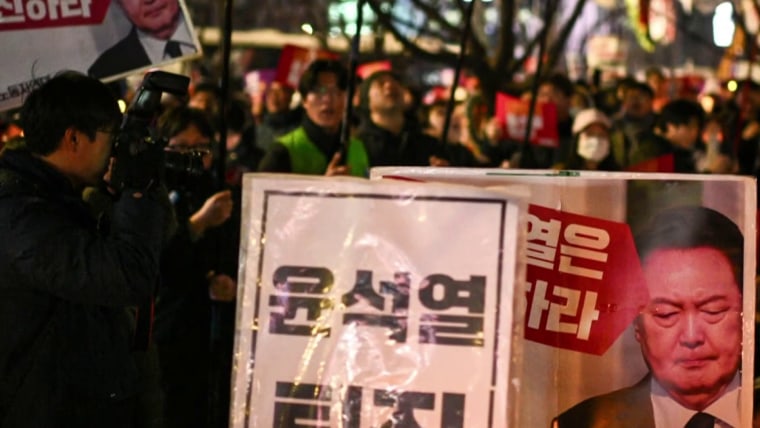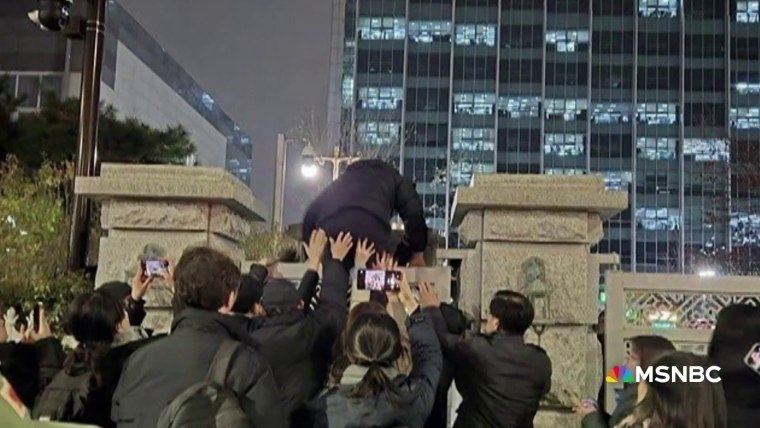This is an adapted excerpt from the Dec. 3 episode of "All In with Chris Hayes."
As we in America struggle to uphold our own democratic institutions, there’s a situation playing out in South Korea that is remarkably relevant, disturbing and maybe even a bit hopeful. Early Wednesday, a remarkable scene unfolded when citizens took to the streets to defend their democracy against Yoon Suk Yeol, the country’s erratic far-right president who declared martial law.
It’s a story that might sound familiar to Americans. Yoon is a political novice who ran for president in 2022. Thanks to high inflation and frustration with his liberal predecessor, he narrowly won that election by less than 1% of all the votes cast.
He's sided with the country's anti-feminist movement and made a point of courting South Korean men with an openly misogynist campaign that blamed feminism for low birth rates. As president, he tried to dismantle the government’s gender equity agency.
Yoon’s address to the nation was full of Trumpian inflections.
He tried to raise the country’s maximum weekly working hours from 52 to 69, which as you can imagine was deeply unpopular. Yoon also tried to push through reforms to the country’s medical system, which led to months of mass strikes by doctors and nurses. On top of that, he and his family got embroiled in a bunch of scandals, including allegations of accepting improper gifts.
The upshot was that in parliamentary elections this spring, which saw the highest turnout of the South Korean electorate since the beginning of the 20th century, the opposition party won in a landslide. That left Yoon’s party holding just a third of the country’s National Assembly. Yoon’s approval rating fell to an abysmal 17% in early November. Yoon was talked about as a lame-duck president, which made his declaration late Tuesday all the more shocking.
Yoon’s address to the nation was full of Trumpian inflections. He justified imposing martial law as a way to “defend the free Republic of Korea from the threats of North Korean communist forces and to eradicate the shameless pro-North Korean anti-state forces that are plundering the freedom and happiness of our people and to protect the free constitutional order.”
“Through this emergency martial law, I will rebuild and defend the free Republic of Korea, which is falling into ruin,” Yoon continued. “To this end, I will surely eradicate the criminals of the anti-state forces who have been committing atrocities so far.”
The army general Yoon put in charge then issued the declaration of martial law. If you are wondering what that looks like in the democracy of South Korea, the proclamation stated that “all political activities, including the operations of the National Assembly, local councils, political parties, political associations, assemblies, and demonstrations, are strictly prohibited.”
The order also said, “All media and publications will be subject to the control of the Martial Law Command,” and “Strikes, work slowdowns, and gatherings that incite social disorder are forbidden.”

That’s just a straight-up dictatorship. Within hours, the government revoked freedom of speech, freedom of assembly, freedom of movement and freedom to strike. And remember, all of this is happening in a country where memories of authoritarian rule are fresh. After a series of authoritarian regimes, a military coup swept South Korea in 1979. Those coup plotters smashed protests and established a one-party state that lasted until free elections in 1987.
After Yoon’s martial law announcement last night, South Koreans decided they were not going back. People immediately took to the streets in the freezing cold of night in their parkas.
They did not just protest for the sake of protesting. They had a goal in mind: The country’s legislators could block Yoon’s martial law decree with a simple majority vote. However, his declaration banned political activities and he sent soldiers to the National Assembly building to enforce that ban and block lawmakers from gathering for a vote.
In response, civilian protesters teamed up with those lawmakers to help them scale the capitol building and get inside to cast their votes. It was, as some have described it, a reverse Jan. 6th: Civilians and lawmakers working together to save South Korean democracy.
And it worked. Within three hours of Yoon’s speech, a quorum of lawmakers forced a vote to reject his martial law declaration. The vote was unanimous, all 190 lawmakers who participated in the vote supported the lifting of martial law.
It was, as some have described it, a reverse Jan. 6th: Civilians and lawmakers working together to save South Korean democracy.
Immediately after that vote, television footage showed soldiers who had been stationed at parliament leaving. Six hours after he had declared martial law, as the sun rose over Seoul, Yoon backed down and lifted his order. Protesters celebrated, with many calling for Yoon to resign or be impeached. South Korean opposition parties have already submitted a motion to impeach the president.
It’s exciting, energizing and inspiring to watch everyday Koreans, whose politics might be all over the place, come out to stand up for democracy. They stood together and stood up to armed soldiers. They literally pushed their lawmakers to pass a law saving their democratic institutions. They did this all to resist a far-right, misogynist president who won by the skin of his teeth and decided he had a mandate to make over the country in his image, even as he frittered away all his political capital and grew historically unpopular.
There’s a lesson there for Americans in 2024: A reminder that, in the end, the people themselves are the last bulwark of democracy, working with and through an elected opposition that is unafraid to do the right thing.
Allison Detzel contributed.

